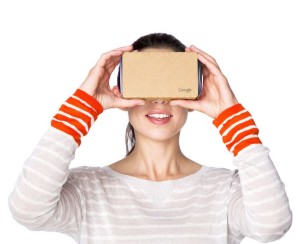You’re a new media expert, specializing in video, social media, liveblogging or infograhics? Get ready for the final breakthrough in virtual reality, which is starting to impact sectors such as education and even the newspaper industry. As a columnist about new media for the business newspaper De Tijd in Belgium, I realized this year that there’s little time left to get ready for the transformation virtual reality will cause in very diverse industries.
When Facebook bought Oculus VR in 2014, Mark Zuckerberg said:
This is really a new communication platform. By feeling truly present, you can share unbounded spaces and experiences with the people in your life. Imagine sharing not just moments with your friends online, but entire experiences and adventures.
Zuckerberg sees virtual reality changing industries such as healthcare, education and sports news coverage. This evolution will take quite a few years, but the future is being prepared now and early but convincing examples will be soon accessible for huge audiences. Also take note that Facebook and YouTube enable users to post 360 degree videos, right now.
I’ll present you two recent articles demonstrating the high expectations regarding virtual reality, then I’ll give my recommendations.
The first article was published in the British newspaper The Financial Times and seems totally enthusiastic: Our virtual reality future is bigger than it appears. The author of the article, Jonathan Margolis, became firmly convinced about virtual reality during a number of meetings in Los Angeles.
Interesting enough, the breakthrough is not “just” in entertainment. Education for instance is very interested in the new possibilities. Roy Taylor, a vice-president of the chipmaker AMD, told Margolis: “VR is happening here on a scale and with an energy you can’t believe.†Taylor added that the universities are pouring “millions of dollars into it.†Â
The author of the article also refers to first-hand experience: he was totally blown away by a virtual reality video about the Wright Brother’s flight. He watched it using the Oculus Rift virtual reality headset.
Personally I use a prototype of the Oculus Rift but recently I bought the Google Cardboard headset – less sophisticated maybe, but very cheap.

(Graphics from https://www.google.com/get/cardboard/)
A second article which is very positive about the future of virtual reality – even outside the traditional gamers communities – comes from Jessica Davies on Digiday. She reports about the worldwide ambitions of the British newspaper The Guardian in sports coverage.
Sports journalism is often very innovative as The Guardian demonstrates with the use of liveblogging. The future of sports coverage will be even more spectacular.  Davies quotes The Guardian’s sports editor Ian Prior as saying: “VR could have major ramifications for live sport experiences and really drive the next iteration of journalism.â€
The New York Times recently sent Google Cardboard virtual headsets to its subscribers. In combination with the app NytVR people can experience news coverage about the refugee crisis and the Paris terror attacks in a far more immersive way.
What should you do in order to keep a close eye on the virtual reality breakthrough?
- Get Google Cardboard – It is cheap and gives access to a lot of interesting virtual reality content, it works with most smartphones.
- Consider buying Samsung Gear VR – This headset works with Samsung smartphones and it powered by Oculus Rift.
- Wait for Oculus Rift VR headset –  It will be available for consumers in Q1 201 and you’ll need a gaming PC to get access to a premium quality virtual reality experience.
Summary
Virtual Reality will start going mainstream in 2016, if you want to be part of the action, invest now in getting hands-on experience with it.
 I got inspired for this post as a participant in the Social Media Marketing course at Coursera, created by Northwestern University. Feel free to reach me at @rolandlegrand on Twitter.Â


Nice Work Roland. I read this blog of yours courtesy W3 review assignment 🙂
Thank you. I’ve added a Zuckerberg quote to point out how relevant this is for social media people, not ‘just’ gamers.